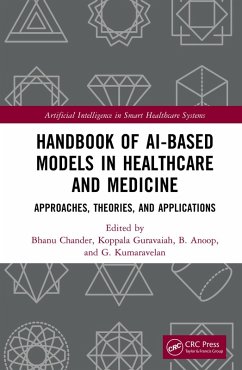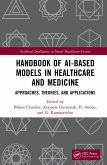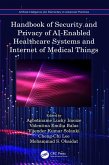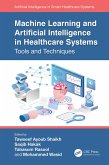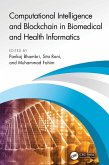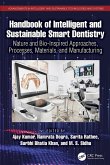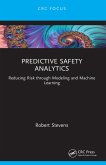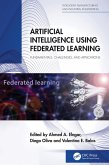Handbook of AI-Based Models in Healthcare and Medicine (eBook, PDF)
Approaches, Theories, and Applications
Redaktion: Chander, Bhanu; Kumaravelan, G.; Anoop, B.; Guravaiah, Koppala
177,95 €
177,95 €
inkl. MwSt.
Sofort per Download lieferbar

89 °P sammeln
177,95 €
Als Download kaufen

177,95 €
inkl. MwSt.
Sofort per Download lieferbar

89 °P sammeln
Jetzt verschenken
Alle Infos zum eBook verschenken
177,95 €
inkl. MwSt.
Sofort per Download lieferbar
Alle Infos zum eBook verschenken

89 °P sammeln
Handbook of AI-Based Models in Healthcare and Medicine (eBook, PDF)
Approaches, Theories, and Applications
Redaktion: Chander, Bhanu; Kumaravelan, G.; Anoop, B.; Guravaiah, Koppala
- Format: PDF
- Merkliste
- Auf die Merkliste
- Bewerten Bewerten
- Teilen
- Produkt teilen
- Produkterinnerung
- Produkterinnerung

Bitte loggen Sie sich zunächst in Ihr Kundenkonto ein oder registrieren Sie sich bei
bücher.de, um das eBook-Abo tolino select nutzen zu können.
Hier können Sie sich einloggen
Hier können Sie sich einloggen
Sie sind bereits eingeloggt. Klicken Sie auf 2. tolino select Abo, um fortzufahren.

Bitte loggen Sie sich zunächst in Ihr Kundenkonto ein oder registrieren Sie sich bei bücher.de, um das eBook-Abo tolino select nutzen zu können.
This handbook provides thorough, in-depth, and well-focused developments of AI, ML, DL, NLP, cryptography, and Blockchain approaches along with their applications focused on healthcare systems.
- Geräte: PC
- mit Kopierschutz
- eBook Hilfe
Andere Kunden interessierten sich auch für
![Handbook of AI-Based Models in Healthcare and Medicine (eBook, ePUB) Handbook of AI-Based Models in Healthcare and Medicine (eBook, ePUB)]() Handbook of AI-Based Models in Healthcare and Medicine (eBook, ePUB)177,95 €
Handbook of AI-Based Models in Healthcare and Medicine (eBook, ePUB)177,95 €![Handbook of Security and Privacy of AI-Enabled Healthcare Systems and Internet of Medical Things (eBook, PDF) Handbook of Security and Privacy of AI-Enabled Healthcare Systems and Internet of Medical Things (eBook, PDF)]() Handbook of Security and Privacy of AI-Enabled Healthcare Systems and Internet of Medical Things (eBook, PDF)73,95 €
Handbook of Security and Privacy of AI-Enabled Healthcare Systems and Internet of Medical Things (eBook, PDF)73,95 €![Machine Learning and Artificial Intelligence in Healthcare Systems (eBook, PDF) Machine Learning and Artificial Intelligence in Healthcare Systems (eBook, PDF)]() Machine Learning and Artificial Intelligence in Healthcare Systems (eBook, PDF)62,95 €
Machine Learning and Artificial Intelligence in Healthcare Systems (eBook, PDF)62,95 €![Computational Intelligence and Blockchain in Biomedical and Health Informatics (eBook, PDF) Computational Intelligence and Blockchain in Biomedical and Health Informatics (eBook, PDF)]() Computational Intelligence and Blockchain in Biomedical and Health Informatics (eBook, PDF)173,95 €
Computational Intelligence and Blockchain in Biomedical and Health Informatics (eBook, PDF)173,95 €![Handbook of Intelligent and Sustainable Smart Dentistry (eBook, PDF) Handbook of Intelligent and Sustainable Smart Dentistry (eBook, PDF)]() Handbook of Intelligent and Sustainable Smart Dentistry (eBook, PDF)172,95 €
Handbook of Intelligent and Sustainable Smart Dentistry (eBook, PDF)172,95 €![Predictive Safety Analytics (eBook, PDF) Predictive Safety Analytics (eBook, PDF)]() Robert StevensPredictive Safety Analytics (eBook, PDF)21,95 €
Robert StevensPredictive Safety Analytics (eBook, PDF)21,95 €![Artificial Intelligence Using Federated Learning (eBook, PDF) Artificial Intelligence Using Federated Learning (eBook, PDF)]() Artificial Intelligence Using Federated Learning (eBook, PDF)52,95 €
Artificial Intelligence Using Federated Learning (eBook, PDF)52,95 €-
-
-
This handbook provides thorough, in-depth, and well-focused developments of AI, ML, DL, NLP, cryptography, and Blockchain approaches along with their applications focused on healthcare systems.
Dieser Download kann aus rechtlichen Gründen nur mit Rechnungsadresse in A, B, BG, CY, CZ, D, DK, EW, E, FIN, F, GR, HR, H, IRL, I, LT, L, LR, M, NL, PL, P, R, S, SLO, SK ausgeliefert werden.
Produktdetails
- Produktdetails
- Verlag: Taylor & Francis eBooks
- Seitenzahl: 476
- Erscheinungstermin: 21. Februar 2024
- Englisch
- ISBN-13: 9781003836278
- Artikelnr.: 69693013
- Verlag: Taylor & Francis eBooks
- Seitenzahl: 476
- Erscheinungstermin: 21. Februar 2024
- Englisch
- ISBN-13: 9781003836278
- Artikelnr.: 69693013
- Herstellerkennzeichnung Die Herstellerinformationen sind derzeit nicht verfügbar.
Dr. Bhanu Chander, working as Assistant Professor at Indian Institute of Information Technology (IIIT-K), Pala, Kerala, India, graduated from Acharya Nagarjuna University, Andhra Pradesh, India, and received a postgraduate degree from the Central University of Rajasthan, India. Dr. Bhanu earned a Ph.D. in Machine Learning in Wireless Sensor Networks for Sensor Data Classification from Pondicherry University, India, in 2022. Dr. Bhanu's primary research interests are in the areas of wireless sensor networks, machine learning, and IoT security. As we know, computer science as a field has largely focused on problems relevant to the developed world. The internet and the world wide web have remained largely urban phenomena, which means that a significant fraction of the developing world, especially in rural and underdeveloped regions, remains disconnected from the rest of the world. Dr. Bhanu is an academic reviewer recognized by IEEE, ACM, and Springer, and has served for 16 various scientific journals and conferences in the review process of more than 50 articles. He contributed as a track chair and session chair for numerous international conferences and workshops, and performed as a technical program committee (TPC) member for several international conferences organized by IEEE, Springer, and ACM. He is interested in machine learning techniques for energy-efficient 6G networks, blockchain technology for the security of the Internet of Things and wireless communications, analysis and verification of cryptographic protocols, and identification of novel features or misclassified features in satellite image analysis. He published eight articles in peer-reviewed journals, five international conferences, and eight book chapters (Elsevier, Wiley, CRC, and Springer). Presently, his main areas of interest include wireless sensor networks (WSN), IoT and healthcare, cryptography, machine learning, and deep learning. Dr. Anoop, working as Postdoctoral Research Fellow at Glenn Biggs Institute for Alzheimer's and Neurodegenerative Diseases, University of Texas Health Science Centre, US, received a Ph.D. degree in the Development of Automated Methods for Retinal Optical Coherence Tomography Image Analysis from the National Institute of Technology, Surathkal, India, in 2021 and M.Tech on Signal Processing from National Institute of Technology, Calicut, India, 2013. He received the Best Paper award at the ninth International Conference on Pattern Recognition and Machine Intelligence, PReMI 2021 for the work entitled "Attention-Assisted Patchwise CNN for the Segmentation of Fluids from the Retinal Optical Coherence Tomography Images" Organized by Machine Intelligence Unit, Indian Statistical Institute (ISI), Kolkata, India, in December 2021. He attended the 43rd-annual International Conference of the IEEE Engineering in Medicine and Biology Society (EMBC21). Research fellow on a project entitled "Retinal Cysts Identification and Quantification from Low-SNR Optical Coherence Tomography Scans Using Image Processing Techniques" (funding agency: DST-SERB) from May 2017 to March 2020. He has membership in the professional bodies IEEE, IEEE Signal Processing, Engineering in Medicine and Biology Society, and Internet Society. He published six articles in peer-reviewed journals and two book chapters. Presently, his main areas of interest include medical image processing, deep learning, GANs and auto-encoders. Dr. Koppala Guravaiah, working as Assistant Professor at Indian Institute of Information Technology (IIIT-K), Pala, Kerala, India, completed a Ph.D. on the topic of Performance of Routing Protocols in Wireless Sensor Networks using River Formation Dynamics from National Institute of Technology Tiruchirappalli, India. His research interests include the Internet of Things (IoT), wireless sensor networks, MANETs, applications and security aspects in IoT, WSN, and MANETs, and natural language processing. He is an active speaker at various international and national conferences. He contributed as a track chair and session chair for numerous international conferences and workshops and pe0rformed as a technical program committee member for several international conferences. He has published in five journals, eight conferences, and contributed two book chapters in the areas mentioned above. He is a member of various professional research bodies, such as IEEE and ACM. Dr. G. Kumaravelan currently serves as Associate Professor at Department of Computer Science, School of Engineering and Technology, Pondicherry University, Karaikal Campus, Karaikal, India. He received his M.Tech in Advanced Information Technology and his Ph.D. in Computer Science from Bharathidasan University, Trichy, India, in 2009 and 2013, respectively. He has published more than 25 research papers in reputed international journals indexed in Scopus and SCI and conferences including IEEE, SPRINGER, and ACM. He received two best paper awards in the international conferences organized by the IITs. He has received "Best Teacher Award" from Pondicherry University, based on students' evaluation, for the past six years (2013-14, 2014-15, 2015-16, 2016-17, 2017-18, and 2018-19). He has gained 17 years of rich teaching and research experience. He is an active reviewer in various international conferences and peer-reviewed journals, and has reviewed more than 200 papers. He has acted as a resource person in various FDPs, conferences, and seminars in higher educational institutions. He contributed as a track chair and session chair for numerous international conferences and workshops and performed as a TPC member for several international conferences. His research interests include the Internet of Things, cloud computing, big data analytics, wireless communications, and networking.
Chapter 1 Edge Computing in Healthcare: Concepts, Tools, Techniques, and Use Cases
Chapter 2 History and Role of AI in Healthcare and Medicine
Chapter 3 Drug Discovery Using Explainable AI Approaches: The Current Scenario
Chapter 4 Supervised Learning Models for Diagnosing Severity of Cirrhosis Disease
Chapter 5 3D Volumetric Computed Tomography from 2D X-Rays: A Deep Learning Perspective
Chapter 6 GAN-Based Encoder-Decoder Model for Multi-Label Diagnostic Scan Classification and Automated Radiology Report Generation
Chapter 7 A Survey of Machine Learning- and Deep Learning-Based Techniques for Diabetic Retinopathy Screening
Chapter 8 An Embedded Solution for Real-Time Implementation of a Deep Learning Model for Malicious Breast Tumour Detection
Chapter 9 Towards Robust Diagnosis of Alzheimer's Disease Using Ensemble Framework of Convolutional Neural Network and Vision Transformer
Chapter 10 RetinalAlexU-Net: Segmentation of the Retinal Vascular Network for the Diagnosis of Diabetic Retinopathy
Chapter 11 Decoding EEG Signals to Generate Images Using GANs
Chapter 12 Mental Health Disorder through Electroencephalogram Analysis using Computational Model
Chapter 13 Machine Learning Techniques in ECG Data Analysis for Medical Applications
Chapter 14 Heartcare Assistance System: A Machine Learning-Based Cardiovascular Risk Monitoring Tool (CRMT)
Chapter 15 Parameter Estimation of Real-Time NCS Signal Acquired Using Designed Neurostimulator to Develop Microcontroller-Based Healthcare Support System
Chapter 16 Critical Analysis of Current Healthcare Applications for Diagnosis of Diseases: Pitfalls and Future
Chapter 17 Machine Learning-Based Decision Support System for Optimal Treatment of Acute Inflammation Response with Specific Patient Conditions
Chapter 18 Digital Histopathology: Paving Future Directions Towards Predicting Diagnosis of Disease Via Image Analysis
Chapter 19 Artificial Intelligence Techniques to Design Epitope-Mapped Vaccines and Diagnostics for Emerging Pathogens
Chapter 20 DN-Based DTI Model to Identify Potential Drug Molecules Against COVID-19
Chapter 21 Deep Learning-Based Chatbots for Patient Queries
Chapter 22 Autism, ADHD and Dyslexia Disorder Comorbidity: An Enhanced Study on Education for Children through Artificial Intelligence-Enabled Personalized Assistive Tools
Chapter 2 History and Role of AI in Healthcare and Medicine
Chapter 3 Drug Discovery Using Explainable AI Approaches: The Current Scenario
Chapter 4 Supervised Learning Models for Diagnosing Severity of Cirrhosis Disease
Chapter 5 3D Volumetric Computed Tomography from 2D X-Rays: A Deep Learning Perspective
Chapter 6 GAN-Based Encoder-Decoder Model for Multi-Label Diagnostic Scan Classification and Automated Radiology Report Generation
Chapter 7 A Survey of Machine Learning- and Deep Learning-Based Techniques for Diabetic Retinopathy Screening
Chapter 8 An Embedded Solution for Real-Time Implementation of a Deep Learning Model for Malicious Breast Tumour Detection
Chapter 9 Towards Robust Diagnosis of Alzheimer's Disease Using Ensemble Framework of Convolutional Neural Network and Vision Transformer
Chapter 10 RetinalAlexU-Net: Segmentation of the Retinal Vascular Network for the Diagnosis of Diabetic Retinopathy
Chapter 11 Decoding EEG Signals to Generate Images Using GANs
Chapter 12 Mental Health Disorder through Electroencephalogram Analysis using Computational Model
Chapter 13 Machine Learning Techniques in ECG Data Analysis for Medical Applications
Chapter 14 Heartcare Assistance System: A Machine Learning-Based Cardiovascular Risk Monitoring Tool (CRMT)
Chapter 15 Parameter Estimation of Real-Time NCS Signal Acquired Using Designed Neurostimulator to Develop Microcontroller-Based Healthcare Support System
Chapter 16 Critical Analysis of Current Healthcare Applications for Diagnosis of Diseases: Pitfalls and Future
Chapter 17 Machine Learning-Based Decision Support System for Optimal Treatment of Acute Inflammation Response with Specific Patient Conditions
Chapter 18 Digital Histopathology: Paving Future Directions Towards Predicting Diagnosis of Disease Via Image Analysis
Chapter 19 Artificial Intelligence Techniques to Design Epitope-Mapped Vaccines and Diagnostics for Emerging Pathogens
Chapter 20 DN-Based DTI Model to Identify Potential Drug Molecules Against COVID-19
Chapter 21 Deep Learning-Based Chatbots for Patient Queries
Chapter 22 Autism, ADHD and Dyslexia Disorder Comorbidity: An Enhanced Study on Education for Children through Artificial Intelligence-Enabled Personalized Assistive Tools
Chapter 1 Edge Computing in Healthcare: Concepts, Tools, Techniques, and Use Cases
Chapter 2 History and Role of AI in Healthcare and Medicine
Chapter 3 Drug Discovery Using Explainable AI Approaches: The Current Scenario
Chapter 4 Supervised Learning Models for Diagnosing Severity of Cirrhosis Disease
Chapter 5 3D Volumetric Computed Tomography from 2D X-Rays: A Deep Learning Perspective
Chapter 6 GAN-Based Encoder-Decoder Model for Multi-Label Diagnostic Scan Classification and Automated Radiology Report Generation
Chapter 7 A Survey of Machine Learning- and Deep Learning-Based Techniques for Diabetic Retinopathy Screening
Chapter 8 An Embedded Solution for Real-Time Implementation of a Deep Learning Model for Malicious Breast Tumour Detection
Chapter 9 Towards Robust Diagnosis of Alzheimer's Disease Using Ensemble Framework of Convolutional Neural Network and Vision Transformer
Chapter 10 RetinalAlexU-Net: Segmentation of the Retinal Vascular Network for the Diagnosis of Diabetic Retinopathy
Chapter 11 Decoding EEG Signals to Generate Images Using GANs
Chapter 12 Mental Health Disorder through Electroencephalogram Analysis using Computational Model
Chapter 13 Machine Learning Techniques in ECG Data Analysis for Medical Applications
Chapter 14 Heartcare Assistance System: A Machine Learning-Based Cardiovascular Risk Monitoring Tool (CRMT)
Chapter 15 Parameter Estimation of Real-Time NCS Signal Acquired Using Designed Neurostimulator to Develop Microcontroller-Based Healthcare Support System
Chapter 16 Critical Analysis of Current Healthcare Applications for Diagnosis of Diseases: Pitfalls and Future
Chapter 17 Machine Learning-Based Decision Support System for Optimal Treatment of Acute Inflammation Response with Specific Patient Conditions
Chapter 18 Digital Histopathology: Paving Future Directions Towards Predicting Diagnosis of Disease Via Image Analysis
Chapter 19 Artificial Intelligence Techniques to Design Epitope-Mapped Vaccines and Diagnostics for Emerging Pathogens
Chapter 20 DN-Based DTI Model to Identify Potential Drug Molecules Against COVID-19
Chapter 21 Deep Learning-Based Chatbots for Patient Queries
Chapter 22 Autism, ADHD and Dyslexia Disorder Comorbidity: An Enhanced Study on Education for Children through Artificial Intelligence-Enabled Personalized Assistive Tools
Chapter 2 History and Role of AI in Healthcare and Medicine
Chapter 3 Drug Discovery Using Explainable AI Approaches: The Current Scenario
Chapter 4 Supervised Learning Models for Diagnosing Severity of Cirrhosis Disease
Chapter 5 3D Volumetric Computed Tomography from 2D X-Rays: A Deep Learning Perspective
Chapter 6 GAN-Based Encoder-Decoder Model for Multi-Label Diagnostic Scan Classification and Automated Radiology Report Generation
Chapter 7 A Survey of Machine Learning- and Deep Learning-Based Techniques for Diabetic Retinopathy Screening
Chapter 8 An Embedded Solution for Real-Time Implementation of a Deep Learning Model for Malicious Breast Tumour Detection
Chapter 9 Towards Robust Diagnosis of Alzheimer's Disease Using Ensemble Framework of Convolutional Neural Network and Vision Transformer
Chapter 10 RetinalAlexU-Net: Segmentation of the Retinal Vascular Network for the Diagnosis of Diabetic Retinopathy
Chapter 11 Decoding EEG Signals to Generate Images Using GANs
Chapter 12 Mental Health Disorder through Electroencephalogram Analysis using Computational Model
Chapter 13 Machine Learning Techniques in ECG Data Analysis for Medical Applications
Chapter 14 Heartcare Assistance System: A Machine Learning-Based Cardiovascular Risk Monitoring Tool (CRMT)
Chapter 15 Parameter Estimation of Real-Time NCS Signal Acquired Using Designed Neurostimulator to Develop Microcontroller-Based Healthcare Support System
Chapter 16 Critical Analysis of Current Healthcare Applications for Diagnosis of Diseases: Pitfalls and Future
Chapter 17 Machine Learning-Based Decision Support System for Optimal Treatment of Acute Inflammation Response with Specific Patient Conditions
Chapter 18 Digital Histopathology: Paving Future Directions Towards Predicting Diagnosis of Disease Via Image Analysis
Chapter 19 Artificial Intelligence Techniques to Design Epitope-Mapped Vaccines and Diagnostics for Emerging Pathogens
Chapter 20 DN-Based DTI Model to Identify Potential Drug Molecules Against COVID-19
Chapter 21 Deep Learning-Based Chatbots for Patient Queries
Chapter 22 Autism, ADHD and Dyslexia Disorder Comorbidity: An Enhanced Study on Education for Children through Artificial Intelligence-Enabled Personalized Assistive Tools
